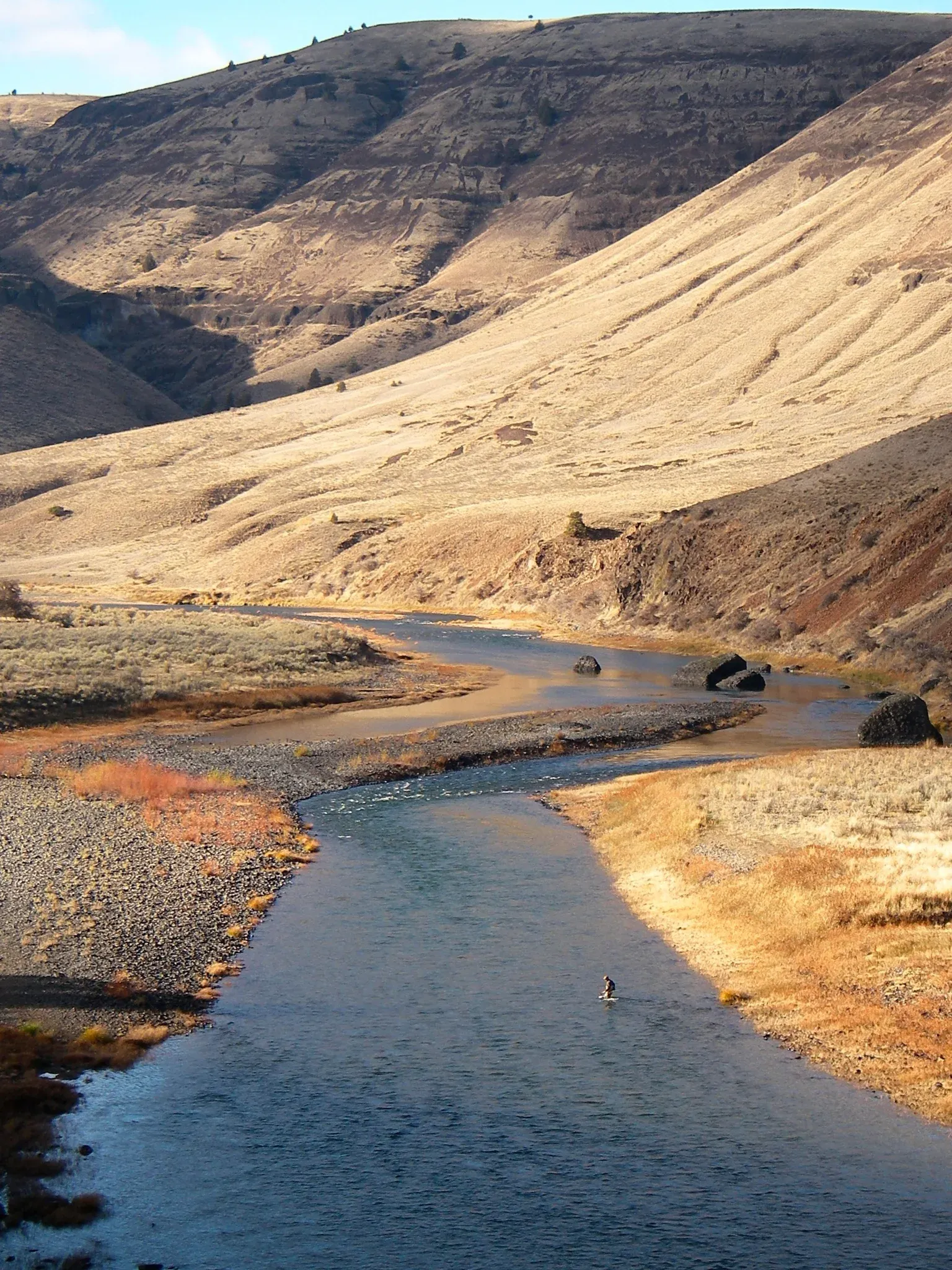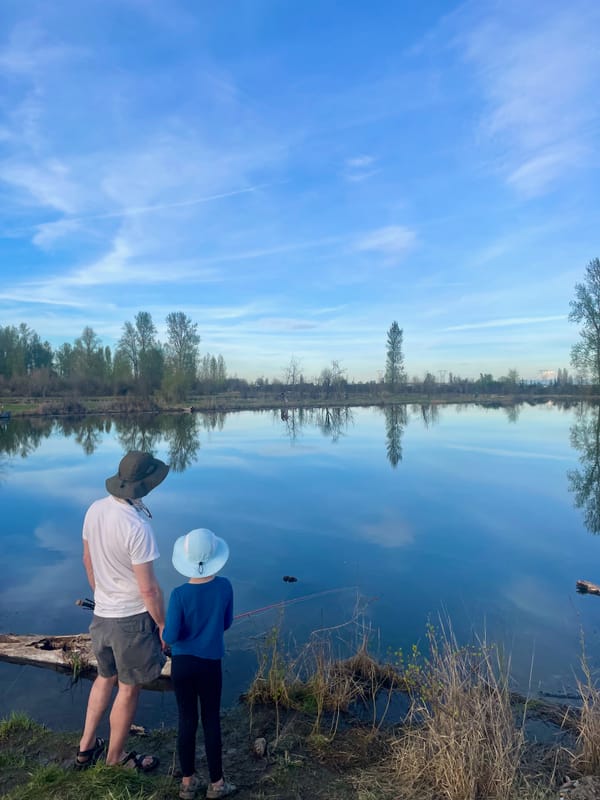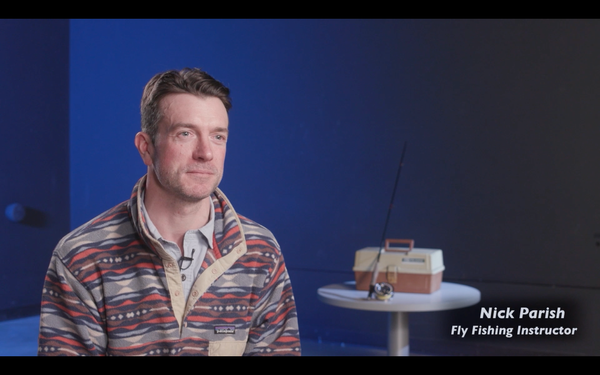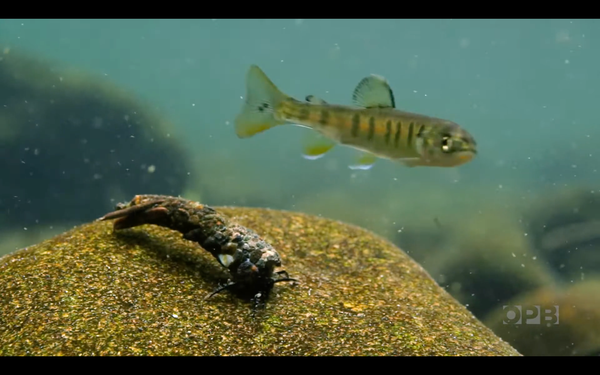This season's most essential piece of fly-fishing gear
The dirt-cheap wonder-tool any angler can use to become legendary.

There's one must-have tool for every angler headed to the river or lake to fly-fish this season. One you don't want to leave home without.
It's not a fancy thermometer, or knot-tying tool, or a new tippet holder.
Ta-da! It's a handy-dandy trash grabber:

Garbage grabber, garbage glomper, trash tongs, trash picker: Whatever you call it, this is this season's must-have fly-fishing accessory.
(Aside: I like glomper, because what even is glomping? It feels like a made-up word, a portmanteau of glom and chomp. It suggests the claw of the grabber is a set of jaws. The jaws go glomp glomp glomp. Is it made up? Has anyone heard it before? Where did it come from? I can't figure that out.)
Why is a trash grabber the most important fly-fishing tool? Not because it'll help you fish. It's this seasons hip, must-have accessory so you can pick up trash at your fishing spots. Because they'll be visited by fewer official trash-picker-uppers, and just the same amount of nitwits who litter.
Natural areas need you more than ever
Like I said: The places you're visiting this fly-fishing season are going to be visited even less frequently than usual by the people whose official day job it is to clean and look after them. And the number of people who use the spaces (and, frankly,
abuse them) stays constant, or grows.
"A reduced federal presence on public lands will certainly hinder efforts to conserve and restore imperiled wildlife, and it may impact the timber industry. It will also affect the experiences of millions of people who flock to the Pacific Northwest’s national forests, national parks and other public lands each summer," writes Nick Engelfried at Columbia Insight (emphasis mine). Engelfried lists trash pickup and toilet cleaning as services impacted by the indiscriminate shuttering of taxpayer-funded services.
Here's the thing: We can't count on our fellow humans to get any less slovenly overnight. Nobody will develop the simple combination of common courtesy and good manners that reminds them to clean up after themselves. Their parents didn't care, so neither will they, or their children. No one ever offered a dramatic reading of Chief Seattle's Speech, helping them see, "whatever befalls the earth, befalls the sons of the earth. If men spit upon the ground, they spit upon themselves."
Maybe, like me, you're not just self-righteous about littering, but you care about taking care. The one and only Kurt Vonnegut said it best, through his character Eugene Debs Hartke in Hocus Pocus (alas, not Kilgore Trout): "Another flaw in the human character is that everybody wants to build and nobody wants to do maintenance."
Here's another classic bit from that prophetic work:
He predicted, I remember, that human slavery would come back, that it had in fact never gone away. He said that so many people wanted to come here because it was so easy to rob the poor people, who got absolutely no protection from the Government. He talked about bridges falling down and water mains breaking because of no maintenance. He talked about oil spills and radioactive waste and poisoned aquifers and looted banks and liquidated corporations. “And nobody ever gets punished for anything,” he said. “Being an American means never having to say you’re sorry.”
The wonders of the garbage glomper
Whatever you call your tool, if it has a proper name, or a given name, or a secret name you've given it after years of time together, the tool is all about one thing: Speed, baby.
Once you get good with this thing, you don't need to slow down or break stride to snag a candy wrapper in the weeds by the side of the road, or that aluminum can by the side of the trail. You can just whip it out and bang bang bang, you've snared three pieces of trash.
I once cleared out a campsite by a bike trail in the forest, where someone's used needle jug had broken apart. Easily 200 used needles were strewn across the forest floor. Gross! But, also, what a challenge with the grabber.
Those tiny needle barrels are barely 1/8" across. Boy, at the end of that afternoon, my hand was sore. But it was the masterclass in glomping—I could snag a cigarette butt at a trot after that.
Working the jaws gives the satisfaction of any simple machine. Just squeeze and it's in your mechanical grasp. You can pivot at your waist like you're doing the robot for style points.
Best of all? These things are dead cheap. I got mine for $4.99 at Harbor Freight ($2.99 now!). It stays in the truck, ready when I need it, to tidy up a campsite, and live by the golden rule of the outdoors: Leave it better than you found it.
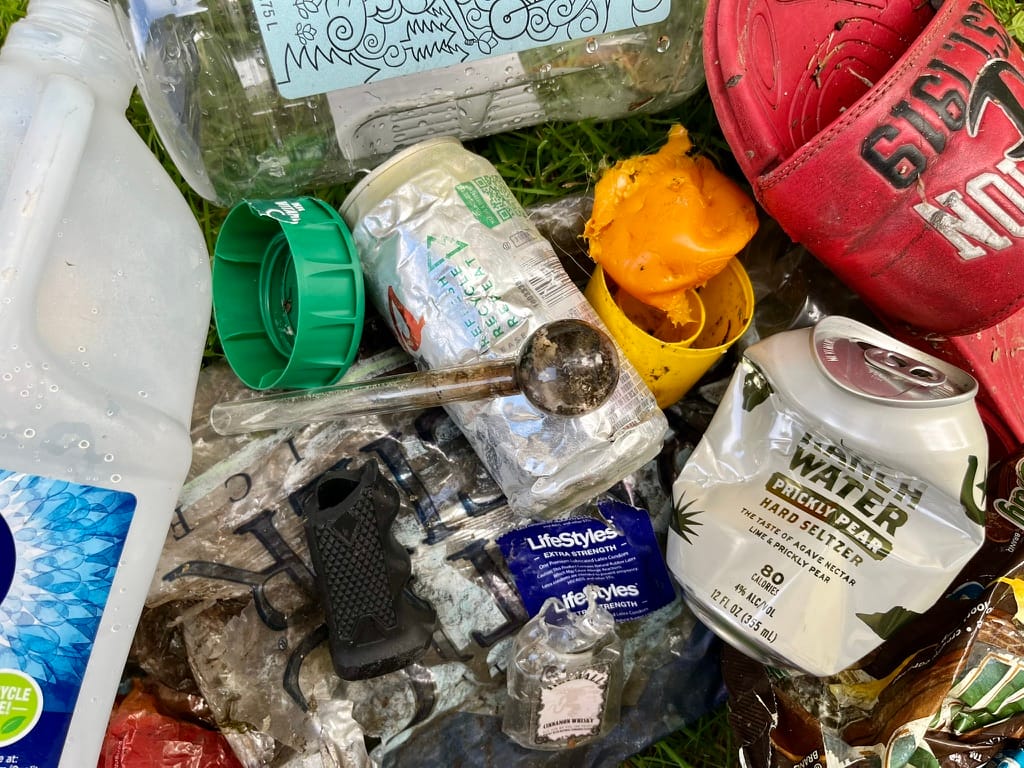
Take this trash and shove it
OK, I know what you're wondering: "Dude...first, that's disgusting...second, where do you put all this trash?"
Well, it's not disgusting. It's just trash. We all make it. There's just a mental defect for some making it hard to pack it out and put it in the proper place.
Here's a confession: Sometimes I pick up other people's trash with my bare hands. Usually it's not anything too revolting. Certainly don't do that with needles. I try to stay away from handling anything resembling a biohazard, or anything that seems, well, how to put this delicately, juicy.
But lots of trash in nature has been there long enough to dry out, and you can just stick it in your special trash pocket.
And that leads to my short answer on where to put it: a trash stash. I don't mean the wispy thing Rusty had on his upper lip in sixth grade. I usually have at least one designated area on my person established to stow crap I pick up to pack out.
Slightly longer answer: you need a designated place where I know it won't mingle with non-trash. Most times, with non-glomping missions (e.g. whenever I'm fishing, like literally wading and casting) that's the second cupholder on my hip pack. I use one for a water or coffee, depending on the time of day, and the other for random litter I pick up along the way.
Small stuff is easy. For big stuff, a simple trash bag won't do. You need something more durable. A container that can survive multiple encounters with thorns, and pokey sticks by the roadside. A bucket is great for home, but doesn't fold down that well for traveling. I've found the best portable containers are dog food bags, or feed sacks. Sometimes I'll bring along one of our pop-up camping trash cans. (Would you believe this item was a birthday present?) But, a garbage bag will do.
Some fishing companies sell specialized containers for cut-off tippet and leader material, and yes, you find a lot of spare line in the river. I admire the thought, but it always struck me as a little wasteful. I don't need to buy a plastic container to hold the plastic I picked up.
Don't be squeamish, trash won't hurt you.
Unless there's a baby rattlesnake hiding in that old beer can.
A disclaimer
I'm not saying any of this to be holier-than-thou.
I only came by my side-hobby of picking up trash when I was radicalized by David Sedaris and Beau Miles and the fun treasures they've found by the side of the road.
I was enabled by Adopt One Block, a Portland-area charity that encouraged people during the pandemic to pick an area to caretake near them (and just crossed 10,000 volunteers). And I was encouraged by folks like Craig Mod, who has written thoughtful words on the topic of trash, and who's responsible for it.
Adopt One Block sent me a glomper (I'm proud to say I already had my cheapo HF one, so it's my backup) and a five-gallon bucket. I claimed my area to patrol on the AOB site, and became official. I still work my covid stretch. Now, it feels even more timely to expand and range more widely.

Perfect Days in the out-of-doors
If you saw the lovely Wim Winders film Perfect Days, in which a janitor steadily builds his concept of the meaning of life while on a daily route cleaning artsy bathrooms in Tokyo's Shibuya district, you know that the quiet dignity of maintenance can be meditative and existence-affirming.
I first became enamored of the high priests of the custodial arts in school. For how many of us, was that our first vision of manual labor? A janitor working that really long mop thing, then buffing the floors to a mirror shine. Every once in a while, in a time of crisis, applying sawdust to student vomit, stanching the flow of entropy in the universe of learning.
Now, just imagine that in nature's cathedral. That could be you, with your glomper, purifying the vista for the next person.
Oregon Field Guide did a great segment a couple years ago about a fellow called "Two-ply" who lives a similar ritual to Hirayama, the cleaner from Perfect Days, but in a drift boat on the Deschutes, floating from campsite to campsite, cleaning the toilets.
If Two-ply's gone this year due to whatever chicanery is afoot, it's going to be a caca grande kinda situation. I'm not expecting you to be the toilet fairy. But, with your glomper, you can move mountains. (Of trash, to a proper receptacle.)
(n.b. It doesn't hurt to have a shovel in your rig for Advanced Disposal.)
Like I said, I don't do it to be sanctimonious. And I don't glomp angry, like Sedaris. I do it because it needs to be done. It's an improvement I can enact. And I hope you join me this year, because our spots need caretakers.
If anything, here's a selfish reason to do it: Removing trash and other traces of human visitation will put wandering anglers off the scent that it's a place people fish, and maybe bring back a little bit of secrecy.
Whether it's to throw 'em off the trail, or otherwise, get your grabber, and let's throw it out.

